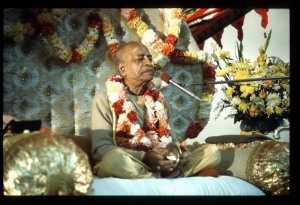CC Madhya 6.136: Difference between revisions
No edit summary |
(Vanibot #0054 edit - transform synonyms into clickable links, which search similar occurrences) |
||
| Line 17: | Line 17: | ||
<div class="synonyms"> | <div class="synonyms"> | ||
''jīvera'' | ''[//vanipedia.org/wiki/Special:VaniSearch?s=jīvera&tab=syno_o&ds=1 jīvera]'' — of the living entity; ''[//vanipedia.org/wiki/Special:VaniSearch?s=asthi&tab=syno_o&ds=1 asthi]'' — the bone; ''[//vanipedia.org/wiki/Special:VaniSearch?s=viṣṭhā&tab=syno_o&ds=1 viṣṭhā]'' — stool; ''[//vanipedia.org/wiki/Special:VaniSearch?s=dui&tab=syno_o&ds=1 dui]'' — two; ''[//vanipedia.org/wiki/Special:VaniSearch?s=śaṅkha&tab=syno_o&ds=1 śaṅkha]'' — conchshell; ''[//vanipedia.org/wiki/Special:VaniSearch?s=go&tab=syno_o&ds=1 go]-[//vanipedia.org/wiki/Special:VaniSearch?s=maya&tab=syno_o&ds=1 maya]'' — cow dung; ''[//vanipedia.org/wiki/Special:VaniSearch?s=śruti&tab=syno_o&ds=1 śruti]-[//vanipedia.org/wiki/Special:VaniSearch?s=vākye&tab=syno_o&ds=1 vākye]'' — in the words of the Vedic version; ''[//vanipedia.org/wiki/Special:VaniSearch?s=sei&tab=syno_o&ds=1 sei]'' — that; ''[//vanipedia.org/wiki/Special:VaniSearch?s=dui&tab=syno_o&ds=1 dui]'' — two; ''[//vanipedia.org/wiki/Special:VaniSearch?s=mahā&tab=syno_o&ds=1 mahā]'' — greatly; ''[//vanipedia.org/wiki/Special:VaniSearch?s=pavitra&tab=syno_o&ds=1 pavitra]'' — pure; ''[//vanipedia.org/wiki/Special:VaniSearch?s=haya&tab=syno_o&ds=1 haya]'' — are. | ||
</div> | </div> | ||
Latest revision as of 23:39, 19 February 2024

A.C. Bhaktivedanta Swami Prabhupada
TEXT 136
- jīvera asthi-viṣṭhā dui—śaṅkha-gomaya
- śruti-vākye sei dui mahā-pavitra haya
SYNONYMS
jīvera — of the living entity; asthi — the bone; viṣṭhā — stool; dui — two; śaṅkha — conchshell; go-maya — cow dung; śruti-vākye — in the words of the Vedic version; sei — that; dui — two; mahā — greatly; pavitra — pure; haya — are.
TRANSLATION
Caitanya Mahāprabhu continued, “Conchshells and cow dung are nothing but the bones and the stool of some living entities, but according to the Vedic version they are both considered very pure.
PURPORT
According to Vedic principles, bones and dung are generally considered very impure. If one touches a bone or stool, he must take a bath immediately. That is the Vedic injunction. Yet the Vedas also enjoin that a conchshell, although the bone of an animal, and cow dung, although the stool of an animal, are very much sanctified. Even though such statements appear contradictory, on the basis of the Vedic version we still accept the fact that conchshells and cow dung are pure and sanctified.